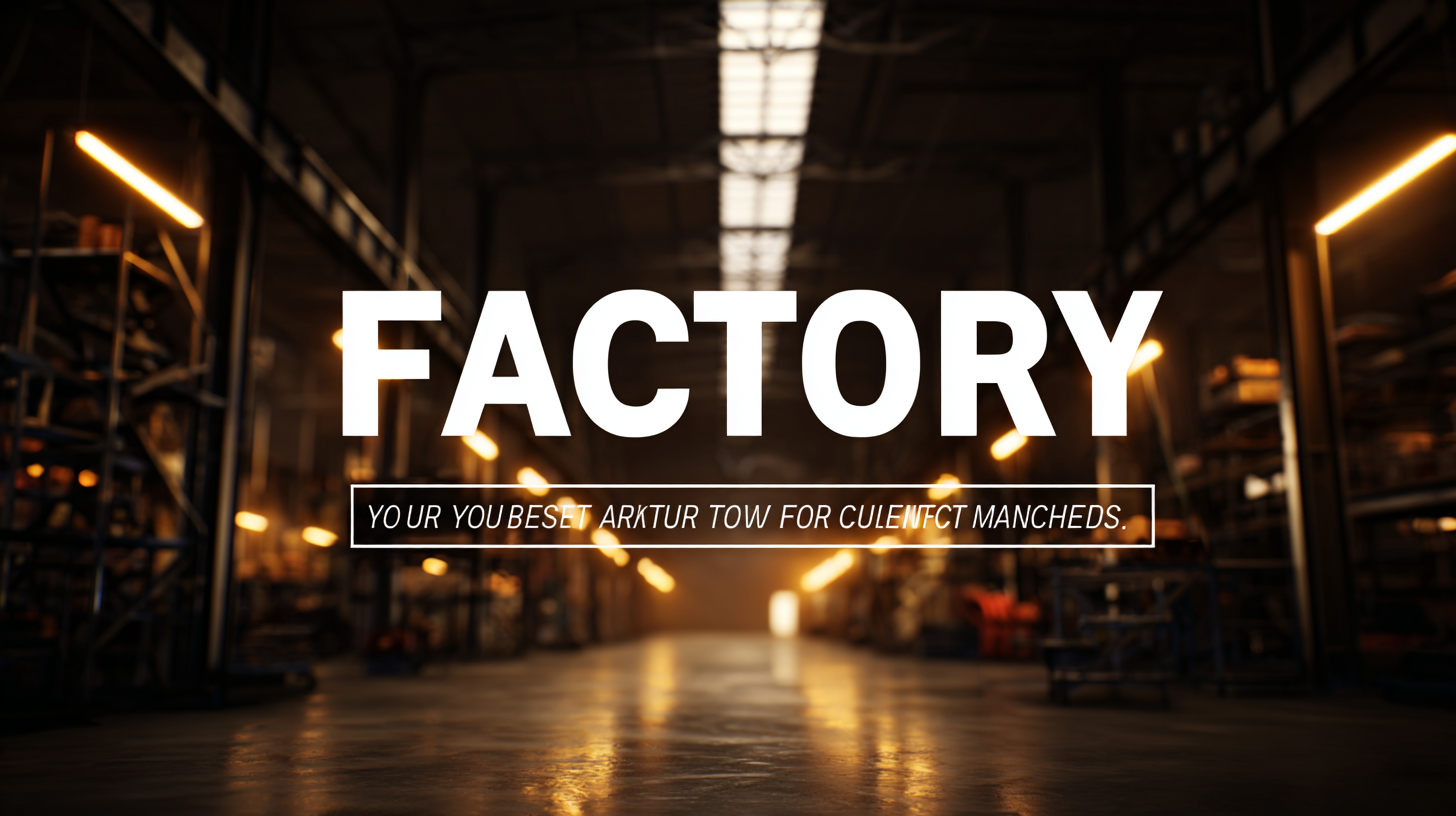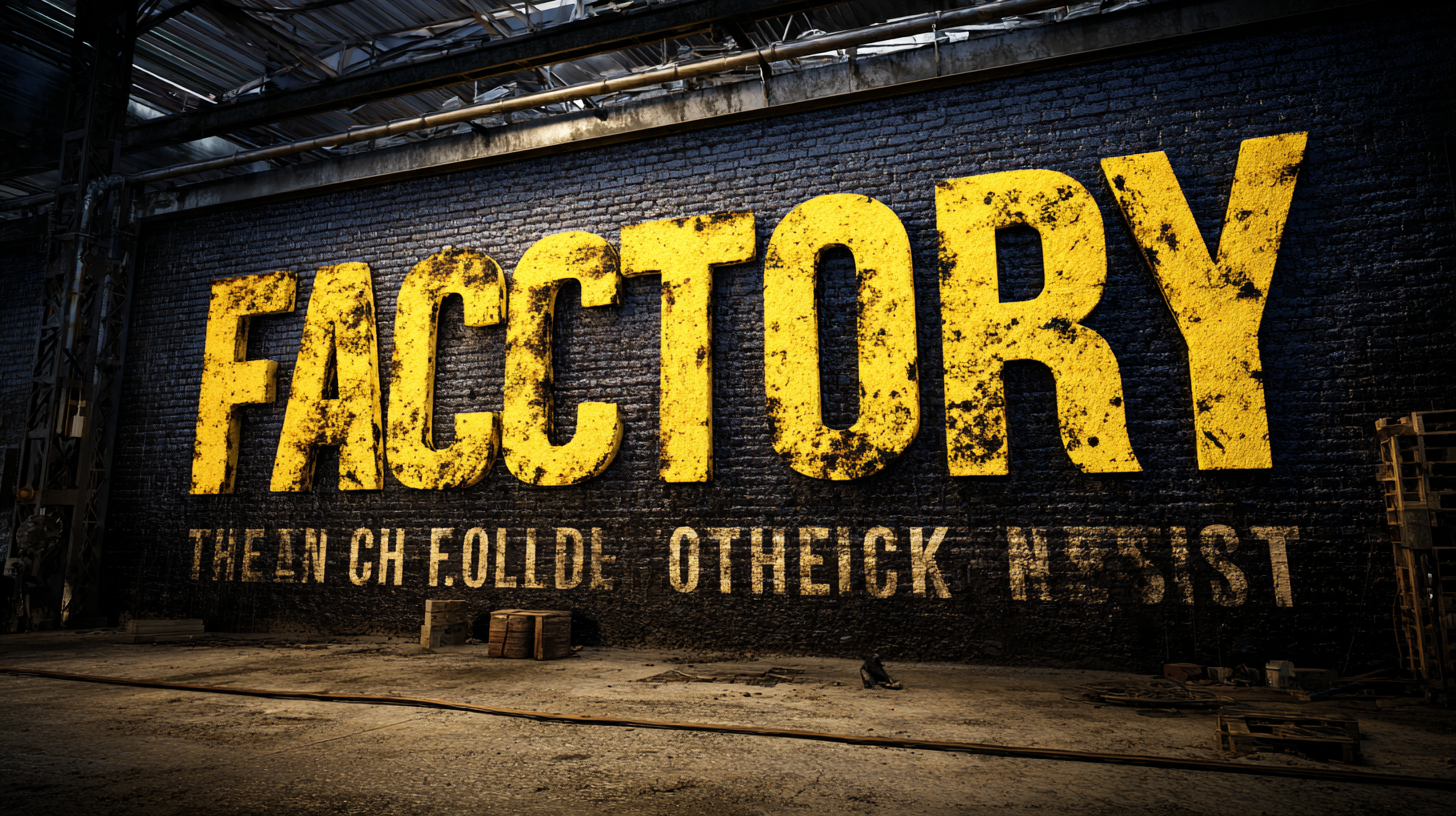- English
- русский
- العربية
- tiếng Việt
- Türkçe
- Deutsch
- 日本語
- 한국어
- ภาษาไทย
- Indonesia
- שפה עברית
- Português
- Español
- Français
- Italiano
- Nederlands
- Polski
- Svenska
- magyar
- Malay
- বাংলা ভাষার
- Dansk
- Suomi
- हिन्दी
- Pilipino
- Gaeilge
- تمل
- český
- ελληνικά
- український
- Javanese
- فارسی
- தமிழ்
- తెలుగు
- नेपाली
- Burmese
- български
- ລາວ
- Latine
- Қазақша
- Euskal
- Azərbaycan
- Slovenský jazyk
- Македонски
- Lietuvos
- Eesti Keel
- Română
- Slovenski
- मराठी
- Srpski језик

Your Ultimate Checklist to Find the Best Factory for Your Manufacturing Needs
In the rapidly evolving manufacturing landscape, finding the right factory to meet your production needs is more critical than ever. According to a recent industry analysis, the global manufacturing market is projected to reach a staggering $9.7 trillion by 2025, driven by advancements in technology and increasing consumer demand. As a result, businesses must navigate a complex array of options when selecting a factory that not only aligns with their operational goals but also adheres to quality standards and sustainability practices. This comprehensive checklist serves as your ultimate guide, ensuring you make informed decisions in an environment where efficiency and innovation are paramount. By leveraging key insights and data points from market reports, we aim to assist manufacturers in identifying the ideal factory tailored to their specific requirements.

Identifying Your Manufacturing Requirements: Key Questions to Ask
When seeking the right factory for your manufacturing needs, it's essential to identify your requirements clearly. Begin by asking yourself critical questions such as: What is the volume of products I need? What are my quality standards? Understanding these factors will help you narrow down your options and find a factory that aligns with your expectations.
Tip: Create a detailed list of your product specifications, including materials, dimensions, and necessary certifications. This will serve as a guideline during discussions with potential factories and ensure they can meet your requirements.
Additionally, consider the factory's capabilities for scalability. Ask, "Can this factory handle an increase in production if needed?" This is crucial if your business is poised for growth. Not only will this save you from the hassle of switching manufacturers later, but it will also help to establish a long-term partnership that can adapt to your evolving needs.
Tip: Schedule factory visits to inspect equipment and production processes firsthand. This will give you a better understanding of their capabilities and help build trust in their operations.

Researching Potential Factories: Where to Start and What to Look For
When embarking on the journey to find the right factory for your manufacturing needs, effective research is paramount. Start by identifying your specific requirements, such as production capabilities, quality standards, and compliance with industry regulations. This focused approach helps narrow down potential factories that not only meet your technical specifications but also align with your business values.
Once you have a list of candidates, delve deeper into evaluating their strengths and weaknesses. Look for factory certifications, customer testimonials, and case studies that showcase their past work. Reach out to previous clients to gain insights into their experiences, as firsthand accounts can reveal critical information about a manufacturer’s reliability and operational efficiency. Additionally, consider the factory’s location and logistics capabilities, as these factors can significantly impact production timelines and costs.
Evaluating Factory Capabilities: Assessing Technology and Capacity
When evaluating factory capabilities, focusing on technology and capacity is paramount for successful manufacturing partnerships. A recent paper highlights the necessity of thorough supplier performance assessments, demonstrating that both manufacturers and suppliers must engage in a dual perspective approach to ensure quality outputs. For instance, suppliers should be evaluated not only on their current technological tools but also on their willingness to adopt new advancements, as the pace of innovation directly influences production capabilities.
In the realm of smart manufacturing, a report indicates that a strategic evaluation of corporate requirements utilizing predictive analytics can significantly enhance decision-making processes. This includes assessing functional and non-functional requirements, fostering a deeper understanding of technological, economic, and social factors that play critical roles in manufacturing environments. Moreover, recent studies on microbial cell factories suggest that strategic systems metabolic engineering can escalate production capabilities in biomanufacturing, highlighting that cutting-edge technological infrastructure is vital for factories aiming to adapt and thrive in an evolving industrial landscape.
Evaluating Factory Capabilities
This chart represents the evaluation of various factory capabilities based on technology and production capacity.
Reviewing Quality Control Measures: Ensuring Consistency and Standards
When searching for the best factory to meet your manufacturing needs, the review of quality control measures is paramount to ensure consistency and adherence to established standards. Quality control (QC) encompasses a range of practices and procedures that factories must implement to ensure the products they produce meet specific criteria. It's essential to assess whether the factory follows internationally recognized QC standards, such as ISO certifications, which serve as a benchmark for quality management systems. Factories that prioritize QC measures will typically conduct regular inspections and testing throughout the production process, enabling them to identify and rectify any issues before products reach the market.
In addition to certifications, inquire about the factory's internal quality assurance protocols. Understanding how they handle deviations from quality standards can provide insight into their commitment to continuous improvement. For instance, factories that maintain detailed documentation of their QC processes are often better equipped to trace problems and implement corrective actions. Engaging with manufacturers who prioritize transparency and have a robust quality management system in place will not only help you ensure product consistency but also foster a successful partnership built on trust and reliability.
Your Ultimate Checklist to Find the Best Factory for Your Manufacturing Needs - Reviewing Quality Control Measures: Ensuring Consistency and Standards
| Measure | Description | Importance Level | Frequency |
|---|---|---|---|
| Quality Audits | Regularly scheduled audits to evaluate manufacturing processes and compliance with standards. | High | Quarterly |
| Incoming Material Inspection | Inspection of raw materials upon arrival to ensure they meet specified requirements. | High | Every Delivery |
| In-Process Inspections | Continuous monitoring of production stages to identify and rectify issues early. | Medium | Every Shift |
| Final Product Testing | Comprehensive testing of finished products to ensure they meet performance and safety standards. | High | Per Batch |
| Customer Feedback Analysis | Collecting and analyzing feedback from customers to identify areas for improvement. | Medium | Monthly |
Establishing Communication and Support: Building Strong Partnerships with Factories
When establishing communication and support with factories, it's crucial to build strong and lasting partnerships. Good communication lays the foundation for understanding expectations and capabilities on both sides, which is vital for a successful manufacturing outcome. Start by clearly defining your needs, timelines, and quality standards. This allows the factory to align with your vision and reduces the chances of misunderstandings.
Tip: Regular updates and meetings can significantly enhance collaboration. Schedule frequent check-ins to address any issues promptly and ensure that both parties are on the same page. This can lead to a more efficient workflow and improve the overall quality of the product.
Additionally, fostering a supportive atmosphere can go a long way in strengthening your partnership. Show appreciation for the factory's efforts and maintain an open line of feedback. Constructive criticism should be balanced with recognition of their strengths, promoting a healthy working relationship that is conducive to growth for both sides.
Tip: Consider investing in training programs or sharing best practices with your factory partners. This not only improves their capabilities but also demonstrates your commitment to the collaboration, reinforcing their loyalty and motivation to meet your manufacturing needs.

